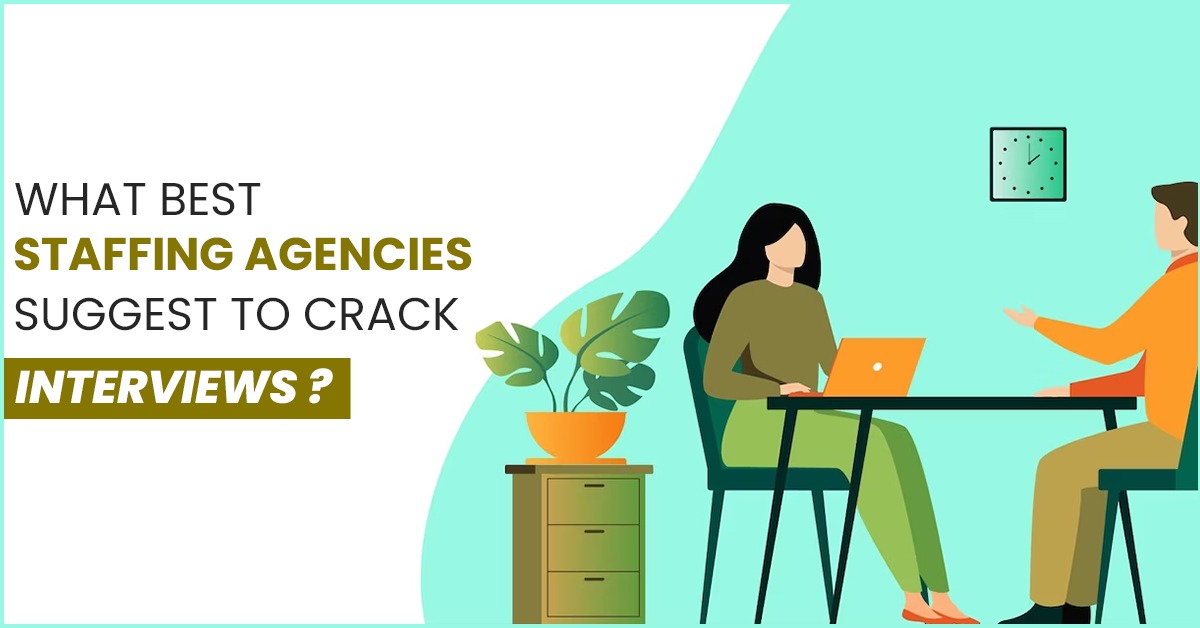
The job interview is often the make-or-break moment in your search for the perfect job, but it doesn’t have to be a source of stress and anxiety. With the right preparation, communication skills, and follow-up strategy, you can confidently nail any job interview and land the job. And, working with the best staffing agencies like ourselves can provide you with additional support and resources to help you succeed. In this article, we will explore the key elements of a successful job interview and provide tips and advice to help you stand out from the competition.
Let’s begin with the preparation
How to prepare for a job interview?
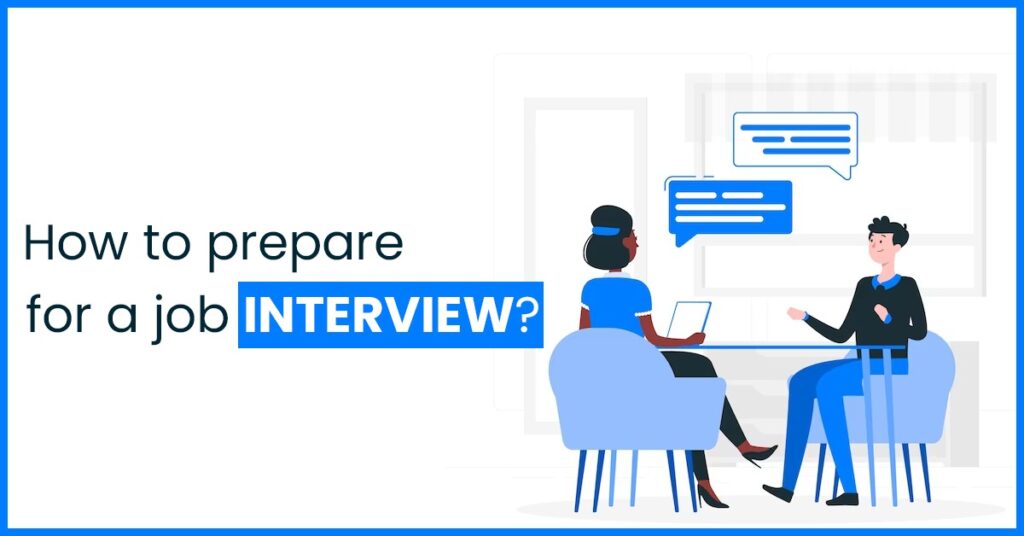
Preparation is the foundation of a successful job interview, and several key steps can be taken to ensure you are ready for any opportunity. By taking the time to properly prepare, you can increase your confidence and demonstrate your professional demeanor and competence to potential employers.
1. First, know about the company and the position you are applying for. This will give you a better understanding of their culture, mission, and goals, and help you tailor your responses to their specific needs.
Utilize the company’s website, social media accounts, and news articles to gain a comprehensive understanding of its operations and current initiatives. You can also consider reaching out to current or former employees or using the best staffing agencies to gain additional insights into the company and position.
2. Next, review common interview questions that are relevant to your industry or position. This will give you an idea of what type of questions to expect and allow you to prepare your responses in advance.
Common interview questions that you must be prepared for are “Tell me about yourself,” “What are your strengths and weaknesses?” and “Why are you interested in this position?” Work on making apt responses that highlight your skillset experience and it also helps to practice your answers in advance.
3. It’s also important to prepare any necessary documents and materials, such as your resume, references, and portfolio of your work.
Make sure to bring multiple copies of your resume and any other relevant documents, and be prepared to provide specific examples and anecdotes to illustrate your achievements and contributions.
Best staffing agencies can also provide you with additional support and resources to help you prepare, including access to interview preparation materials and personalized coaching.
4. Finally, practice your responses and body language in advance. Consider practicing with a friend, family member, or a professional career coach to help you build your confidence and refine your responses.
Pay attention to your body language, such as maintaining good eye contact, speaking clearly and confidently, and using gestures to emphasize your points.
By taking the time to properly prepare, you can increase your chances of nailing any job interview and landing the job of your dreams.
In conclusion, preparation is a critical component of a successful job interview. Take the time to research the company and position, review common interview questions, prepare your responses and practice, and gather any necessary documents and materials.
By utilizing the best staffing agencies to support your job search, you can access additional resources and support to help you succeed. With the right preparation, you can confidently approach any job interview and increase your chances of landing the job.
Moving on to, the First Impressions
How to make a great first impression at a job interview?
First impressions play a critical role in determining your success in a job interview.
A good first impression can set a positive tone for the rest of the interview, making you appear confident and competent, while a bad first impression can leave a lasting negative impact.
Therefore, it’s important to be mindful of the details that contribute to a strong first impression.
One of the most important ways to make a good first impression is to dress appropriately. Dress professionally and choose clothing that reflects the company’s culture and the position you are applying for.
Research the company’s dress code in advance and aim to match the level of formality, whether it’s business casual or more formal business attire.
Avoid wearing anything too revealing or distracting, and make sure your clothes are clean, ironed, and in good condition.
Arriving early is another key aspect of making a good first impression.
Plan to arrive at least 10-15 minutes before the scheduled interview time, and take into account any potential traffic or transportation delays.
Arriving early shows that you are responsible and take the interview seriously, and it also allows you time to prepare mentally and physically for the interview.
Finally, greeting the interviewer with a smile and a firm handshake is a simple but effective way to make a good first impression.
Smile warmly and make eye contact with the interviewer as you shake their hand.
A confident handshake shows that you are comfortable and confident, and it can help you establish a positive rapport with the interviewer.
The next thing to make sure is on-point is your communication skills
Communication Skills required to crack a job interview
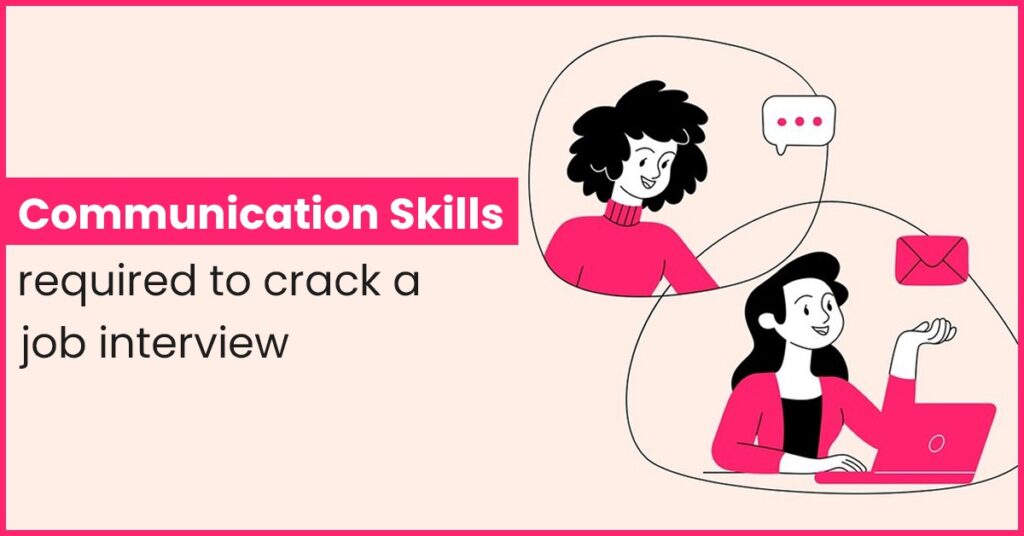
Effective communication skills are essential in any job interview, as they help you convey your skills, experiences, and interests to the interviewer. Good communication skills also demonstrate your professionalism and ability to effectively collaborate and communicate with others, which are highly valued in most workplaces.
Here are some key elements of good communication skills to focus on during a job interview.
- First, listen carefully to the interviewer’s questions. Pay close attention to the questions being asked, and avoid interrupting or speaking over the interviewer. This shows that you are respectful and engaged, and it also gives you the information you need to answer the questions effectively. Additionally, if you don’t understand a question, don’t be afraid to ask for clarification, as this shows that you are actively engaged in the interview process.
- Second, speak clearly and confidently when answering questions. Make sure to enunciate your words and speak at a moderate pace, as this will help you convey your message effectively. Speak in a clear, concise manner, and avoid rambling or speaking too quickly. Confidence is also key, so try to project a calm, professional demeanor, and make eye contact with the interviewer as you speak.
- Third, answer questions honestly and directly. Be straightforward and truthful in your responses, and avoid evading or avoiding questions. This shows that you are confident and transparent, and it also helps you build trust with the interviewer. If you don’t know the answer to a question, be honest and explain what you would do to find the information or ask for help.
- Finally, show enthusiasm and interest in the position. Express your excitement about the opportunity and what you would bring to the role. Ask questions about the company and the position, and demonstrate that you have done your research and are eager to learn more. This shows that you are engaged and motivated, and it also helps you gain a better understanding of the position and the company culture.
Now that was about Communication. But,
How do you demonstrate your qualifications at an interview?
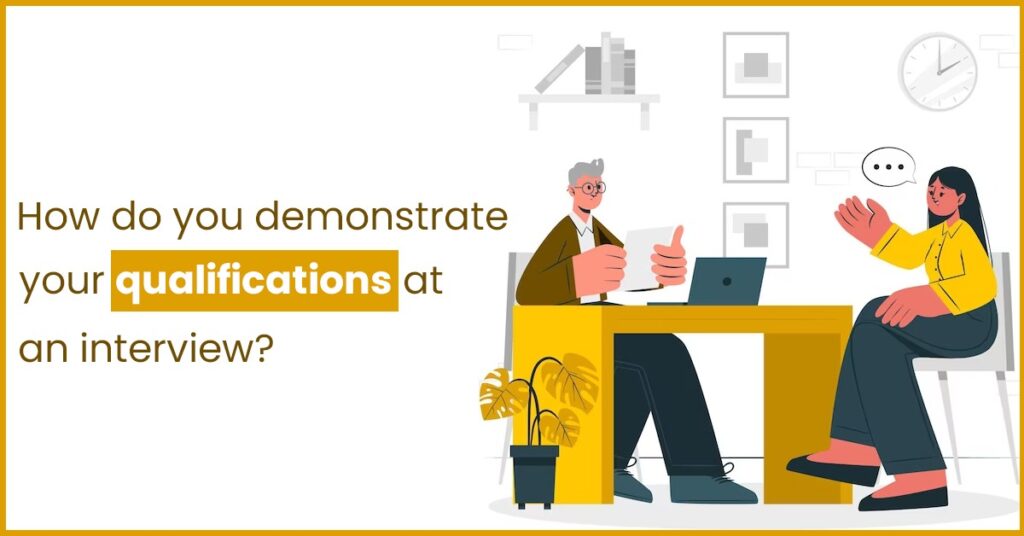
Demonstrating your qualifications is an essential part of any job interview, as it helps you showcase the skills and experiences that make you the best fit for the position. By highlighting your relevant skills and experiences, you can demonstrate your competence and convince the interviewer that you are the right candidate for the job. Here are some key strategies for demonstrating your qualifications.
- First, highlight your relevant skills and experiences. Focus on the skills and experiences that are most relevant to the position, and explain how they make you a strong fit for the role.
Use specific examples and anecdotes to illustrate your skills and experiences, and make sure to link them back to the requirements of the position.
- Second, provide specific examples and anecdotes to support your qualifications.
Use real-life situations to demonstrate your skills and experiences, and describe how you used your skills to solve problems, meet challenges, or achieve specific goals.
This helps bring your qualifications to life and makes them more memorable and compelling to the interviewer.
- Third, emphasize your achievements and contributions. Talk about your accomplishments, and explain how they demonstrate your skills and experiences.
Focus on the impact you have had in your previous roles, and describe how you made a difference and added value to your previous employer.
This shows that your work ethic is goal-oriented, which is what most employers seek.
- Finally, address any potential red flags or concerns about your qualifications.
Be proactive about discussing any potential weaknesses or areas for improvement, and explain how you have overcome them or are working to address them.
This shows that you are transparent and proactive, and it helps you build credibility and trust with the interviewer.
Don’t just go yet. You still must know,
How to close an interview?
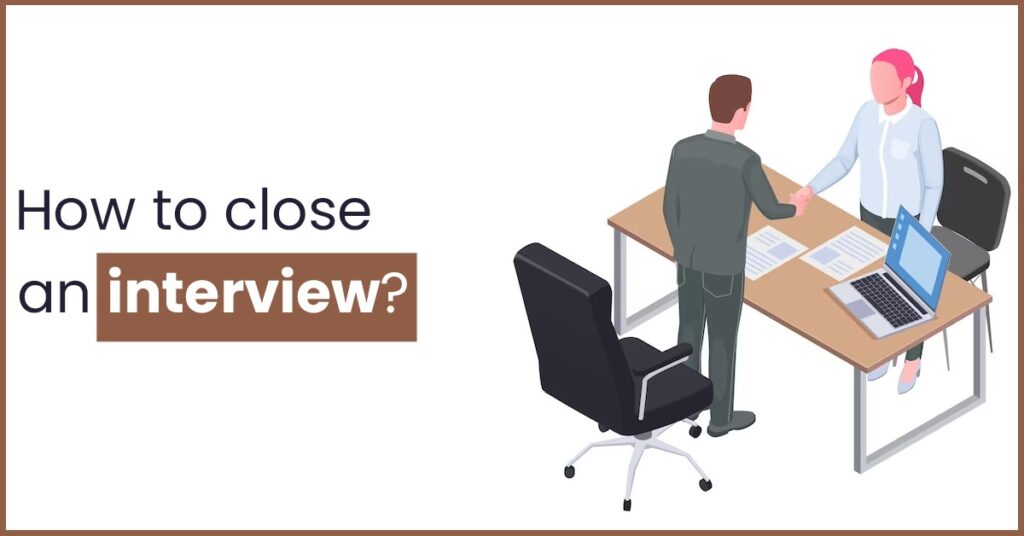
Closing the interview is just as important as any other part of the interview process, as it can help you leave a lasting impression on the interviewer and increase your chances of landing the job. Here are some key strategies for closing the interview effectively.
First, ask informed questions about the company and the position. This shows that you have done your research and are genuinely interested in the opportunity. Ask questions about the company’s culture, values, and goals, and about the specific responsibilities and expectations for the role. Make sure to ask questions that are relevant and specific to the position, and that cannot be easily answered by conducting a quick internet search.
Second, express your interest in the opportunity. Let the interviewer know that you are interested in the position and that you would like to continue the conversation. Explain why you are excited about the opportunity and what you hope to contribute to the company. This helps you leave a positive impression and makes it clear that you are eager to join the team.
Third, follow up with a thank you note or email. Send a thank you note or email to the interviewer within 24-48 hours of the interview, thanking them for their time and reiterating your interest in the opportunity. This helps you build a relationship with the interviewer and shows that you are professional and respectful.
Now the interview is done. But all work is still not done. You still have to analyze your performance!
Here’s what you should do after you are done with your interview
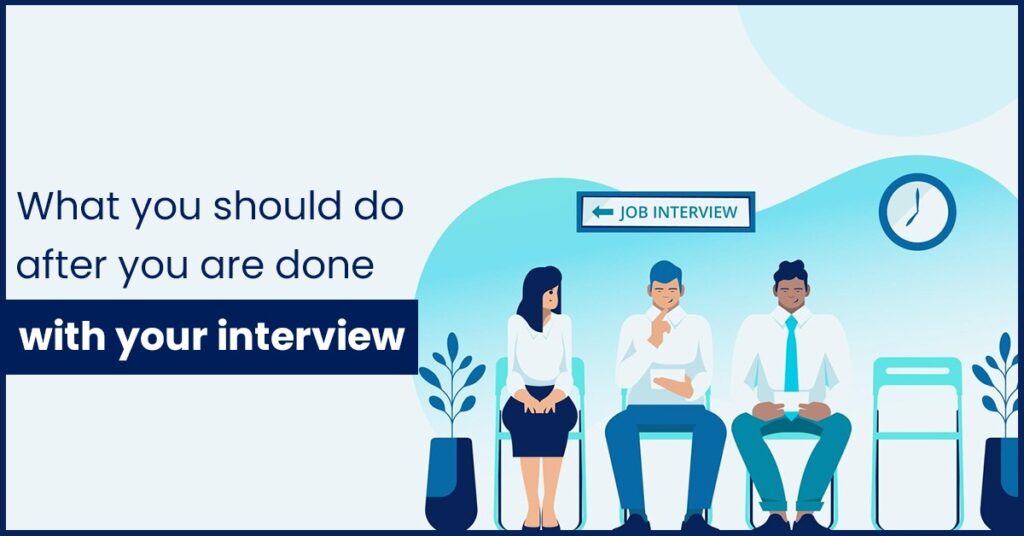
The interview process does not end after the final handshake and the “we will be in touch” line. There are still a few important steps you need to take after the interview, in order to give yourself the best chance of landing the job. Here are some key strategies for what to do after the interview.
First, evaluate the interview and your performance. Reflect on the interview, and consider what went well and what could have gone better. Think about the questions you were asked, and how you answered them. Identifying areas for improvement can help you prepare for future interviews and increase your chances of success.
Second, be patient and wait for a response. It’s important to be patient and avoid contacting the interviewer for a status update unless you were given a specific timeline for when you should expect to hear back. Instead, focus on other job opportunities and keep yourself busy, so that you are prepared when you do receive a response.
Third, prepare for follow-up interviews or negotiations, if necessary. If you are asked to come back for another interview or if you receive an offer, it’s important to be prepared. Consider what questions you may be asked, and think about how you would like to respond. If you receive an offer, be prepared to negotiate salary, benefits, and other key terms, if necessary.









